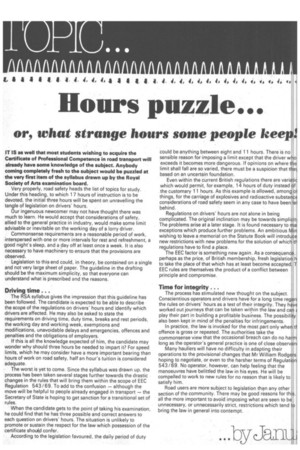Hours puzzle...
Page 70

If you've noticed an error in this article please click here to report it so we can fix it.
or, what strange hours some people keep!
IT IS as well that most students wishing to acquire the Certificate of Professional Competence in road transport will already have some knowledge of the subject. Anybody coming completely fresh to the subject would be puzzled at the very first item of the syllabus drawn up by the Royal Society of Arts examination board.
Very properly, road safety heads the list of topics for study. Under this heading, to which 17 hours of instruction is to be devoted, the initial three hours will be spent on unravelling the tangle of legislation on drivers' hours.
Our ingenuous newcomer may not have thought there was much to learn. He would accept that considerations of safety, allied to the general practice in industry, would make some limit advisable or inevitable on the working day of a lorry driver.
Commonsense requirements are a reasonable period of work, interspersed with one or more intervals for rest and refreshment, a good night's sleep, and a day off at least once a week. It is also necessary to have machinery to ensure that the provisions are observed.
Legislation to this end could, in theory, be contained on a single and not very large sheet of paper. The guideline in the drafting should be the maximum simplicity, so that everyone can understand what is prescribed and the reasons.
Driving time . . .
The RSA syllabus gives the impression that this guideline has been followed. The candidate is expected to be able to describe the scope of the regulations on drivers' hours and identify which drivers are affected. He may also be asked to state the requirements on driving time, duty time, breaks and rest periods, the working day and working week, exemptions and modifications, unavoidable delays and emergencies, offences and penalties and the obligations of employers.
If this is all the knowledge expected of him, the candidate may wonder why should three hours be needed to impart it? For speed limits, which he may consider have a more important bearing than hours of work on road safety, half an hour's tuition is considered adequate.
The worst is yet to come. Since the syllabus was drawn up, the process has been taken several stages further towards the drastic changes in the rules that will bring them within the scope of EEC Regulation 543/69. To add to the confusion — although the move will be helpful to people already engaged in transport — the Secretary of State is hoping to get sanction for a transitional set of rules.
When the candidate gets to the point of taking his examination, he could find that he has three possible and correct answers to each question on drivers' hours. The situation is unlikely to promote or sustain the respect for the law which possession of the certificate should confer.
According to the legislation favoured, the daily period of duty could be anything between eight and 11 hours. There is no sensible reason for imposing a limit except that the driver who exceeds it becomes more dangerous. If opinions on where the limit shall fall are so varied, there must be a suspicion that the based on an uncertain foundation.
Even within the current British regulations there are variatic which would permit, for example, 14 hours of duty instead of the customary 11 hours. As this example is allowed, among 01 things, for the carriage of explosives and radioactive substance considerations of road safety seem in any case to have been lei behind.
Regulations on drivers' hours are not alone in being complicated. The original inclination may be towards simplicit) The problems arise at a later stage. It is found necessary to mal exceptions which produce further problems. An ambitious Min wishing to leave a memorial on the Statute Book will introduce new restrictions with new problems for the solution of which th regulations have to find a place.
The EEC factor is something new again. As a consequence, perhaps as the price, of British membership, fresh legislation h to take the place of that which has at least become accepted. T EEC rules are themselves the product of a conflict between principle and compromise.
Time for integrity. . .
The process has stimulated new thought on the subject. Conscientious operators and drivers have for a long time regarc the rules on drivers' hours as a test of their integrity. They have worked out journeys that can be taken within the law and can E play their part in building a profitable business. The possibility also been kept in mind of the penalties for infringements.
In practice, the law is invoked for the most part only when tF offence is gross or repeated. The authorities take the commonsense view that the occasional breach can do no harm long as the operator's general practice is one of close observant Many hauliers will have no difficulty in adapting their operations to the provisional changes that Mr William Rodgers hoping to negotiate, or even to the harsher terms of Regulation 543/69. No operator, however, can help feeling that the manoeuvres have belittled the law in his eyes. He will be compelled to work to new rules for no reason that is likely to satisfy him.
Road users are more subject to legislation than any other section of the community. There may be good reasons for this. all the more important to avoid imposing what are seen to be unnecessary, or unnecessarily strict, restrictions which tend to bring the law in general into contempt.












































































































